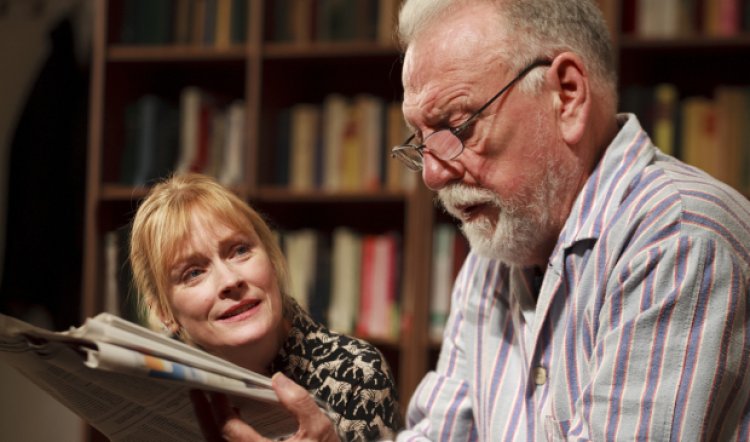
THE FATHER
THE FATHER, Theatre Royal Bath Productions and the Tricycle Theatre, Kilburn; 18 May 2015. Photographs: Claire Skinner and Kenneth Cranham.
Written by Florian Zeller, this 90-minute work won the 2014 Moliere Award for Best Play on its debut in Paris. Translated into English by Christopher Hampton and first staged in Bath before transferring to north London, its UK reviews have reflected the prize: four and five stars and much critical ecstasy.
It was difficult to see why it’s such a hit, however, unless a play described in its blurb as “an intriguing and compelling black comedy” in which the audience rarely laughed is mainly mesmerising because it’s about a topic – dementia – that’s thundering at breakneck speed towards a sizeable proportion of the population.
In an full house of mainly silver or carefully-tinted heads (a rather older audience than this theatre normally attracts) there was little laughter but the crowd was attentive before becoming fidgety about 45 minutes in. That’s when the next 15 minutes seemed to last approximately three hours. That’s what a few scenes that go nowhere or are repetitive will do for you.
The idea is an intriguing one nevertheless: Andre (Kenneth Cranham) is 80 and his daughter Anne (Claire Skinner) and her husband Antoine are living with him in his apartment as he is becoming forgetful. She is trying to get him to accept the presence of a daily carer as she is about to move to London and is convinced he can’t cope on his own.
Or maybe it’s not that at all. It could be that his daughter Anne is actually someone else entirely and is not married to Antoine, has no intention of moving to London and Andre is actually living in her apartment and she has a lover who is not Antoine. And the young women who arrive to perform carer duties are not stealing from him and his precious watch is actually where he hid it. And what about his younger daughter Elise whom he adores but who, unlike Anne, is nowhere to be seen and never visits? Or he is imagining it all, or forgetting it all or perhaps is being deliberately misled…
The early scenes are a cleverly theatrical way of portraying the essence of losing one’s mind. As the various characters come and go – Anne who is played by two actresses and so on – Andre’s confusion becomes tangible and alarming. And the audience is put in the position of wondering what is imagined, what is memory and what is simply not so. At the same time there is a sneaking possibility at the edge of consciousness that there could be unscrupulous motives for untruths – from parent or child, or both.

But, as already noted, repetition and scenelets where nothing happens cause an uncomfortable and unnecessary slump. It’s exacerbated by excruciating scene changes signalled by a blackout while a frame of white light around the proscenium whacks the eyeballs with a searing strobe effect. This retina-burning distraction is accompanied by a sliver of electro-music that progressively disintegrates with each change. Not a subtle message and as the scenes get shorter as the play progresses, the irritation factor rises exponentially.
This is a pity as the set – realistic and highly-lit elegant Parisian apartment living room – also becomes progressively brighter and emptier as furniture disappears (“no dad, nothing’s gone, it’s always been like this, don’t you remember?”) the same message: of a mind gradually decomposing into white-out, is much more powerfully suggested (set – Miriam Buether, lighting – Guy Hoare).
The production, directed by James Macdonald, is carried by Claire Skinner in particular and Kenneth Cranham, when he isn’t bent double to peer at whomever he’s addressing: an odd and jarring tic that doesn’t persuade. But it isn’t helped by seemingly unconvinced and unconvincing performances from the rest of cast (Rebecca Charles, Jim Sturgeon, Colin Tierney and Jade Williams) but perhaps it was a case of Monday-itis, who knows.
The Father may have lost something in translation, although Hampton is no slouch on that front, and perhaps the production is just a bit weary. On the other hand, because it’s an upfront and entertaining take on the dreaded and increasingly topical subject of dementia, maybe it’s gained more kudos than it really deserves. Hard to say, but as already mentioned, there are times when 90 minutes can feel like a lifetime; and this was one of those occasions.



